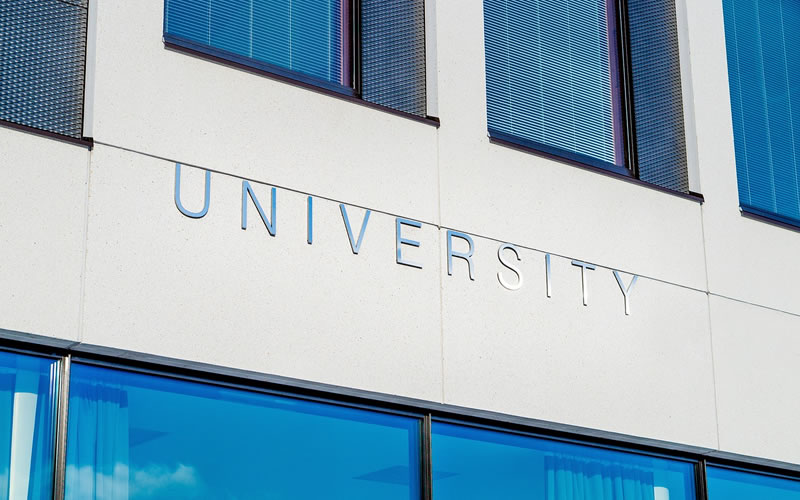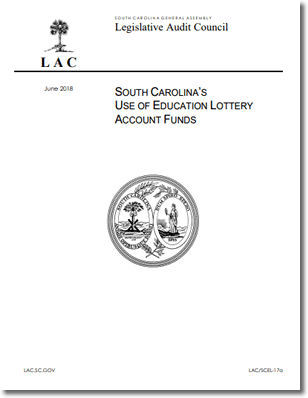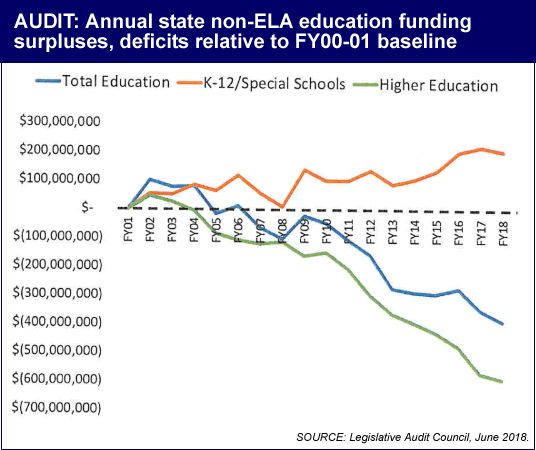
By Andy Brack, editor and publisher | A new independent state audit of South Carolina’s education lottery spending is a damning critique of the way the legislature appropriates education dollars.
Two glaring rebukes stand out in the June report, “South Carolina’s Use of Education Lottery Account Funds,” by the Legislative Audit Council:

Underfunding. Higher education, specifically, has been underfunded $4 billion over 17 years since the education lottery was created. Essentially as the lottery started generating revenue for scholarships and other spending, the state reduced the amount of higher education funding from general tax revenues to levels below what was required by state law. As a result, even though there’s been more spending for scholarships, college tuition has gone up dramatically to make up for general fund reductions.
Education funding murkiness. State lawmakers appropriated $504 million in lottery funds over 14 years to education programs not specified by state law. The spending was made, though, because of inconsistencies with state law defining use of lottery monies. Only $3 million in appropriations for gambling addiction services was identified as potentially unconstitutional.
Since the lottery began in 2002, state lawmakers have appropriated $5 billion in lottery funds to education and other programs. In the 2017 budget year alone, the lottery generated $1.6 billion in ticket sales.
One Statehouse policy insider was pretty blunt about the audit report: “It is at least a pretty damning report coming from an independent non-partisan state agency,” the source said.
“The lottery has been used as a way to cut direct funding to public colleges which supports 100 percent of all in-state students while letting us ‘look like’ we are still funding colleges by providing ‘merit scholarships’ that go to less than one-third of all students at both public and private colleges.”
More on underfunding higher education
The audit says state law is unclear in some ways about how to fund elementary, secondary and higher education. But to get a handle on what’s happening, the former state Budget and Control Board determined from the state’s 2001 appropriations law that 56.71 percent of general fund tax dollars must go to education programs to comply with state law.

“We found that state non-Education Lottery Act (ELA} appropriations for education have frequently fallen short of the level required by statute,” the audit said. “Education appropriations have experienced a cumulative deficit of approximately $2.1 billion since FY 00-01. However, the General Assembly is not legally bound by the requirements in the Education Lottery Act because it has the authority to modify or disregard its prior actions.”
And it has, according to the audit.
Since the 2000-01 budget, the General Assembly has met the 56.71 percent funding level only four years, the report said. But funding between K-12 education and higher education has been dramatically different.
“[Since 2000-01| higher education has contributed approximately $4 billion to the cumulative education deficit, while K-12 education and special schools offset that amount with an approximately $1.9 billion cumulative surplus. In total, we estimate that, relative to the level required by state law, there has been a cumulative state non-ELA education funding deficit of approximately $2.1 billion since FY 00-01.”
The cut in higher education support from general tax revenues has had a dramatic impact, according to one university insider.
“Had state support for higher education continued at late-1990s levels, it seems likely that today we’d be talking about S.C. having some of the very lowest tuitions in the nation. As everyone knows, that’s not what happened, and perhaps there is no universe in which that could have happened.
“But, it is clear that while funding for some aspects of education have rebounded from the cuts enforced by the Great Recession, that hasn’t happened with higher ed. And that has forced a dramatic shift in the funding model.”
On education funding murkiness
The lottery audit also had some harsh words for lottery spending by the legislature, which has appropriated about $5 billion of lottery funds starting in 2002. About 80 percent of funding went to higher education, much of it in the form of scholarships, grants and tuition assistance, while 20 percent went to K-12 and other programs.
The audit notes the way that Education Lottery Act says to spend proceeds isn’t consistent with other state laws. The act says lottery funds can only be spent on specific programs, but the General Assembly has spent an estimated $504 million on “programs and purposes not clearly specified by statue.” Some examples:
- Public higher education technology investments: $164 million;
- K-12 Technology Initiative: $87.9 million;
- “Other” designated programs at the state Department of Education: $64.1 million;
- “Unrestricted” at S.C. State University: $44 million;
- Academic buildings, repair, maintenance and training: $42.6 million;
- Allied Health Initiative at the state Board for Technical and Comprehensive Education (BTCE): $23.2 million;
- Workforce scholarships and grants at BTCE: $18 million. For more, see Table 2.5 in the report.
The report doesn’t say it was wrong for legislators to appropriate money as they did. It notes that the uses weren’t clearly specified by state statute. The audit also noted:
- Funds from unclaimed lottery prizes are supposed to be used for compulsive gambling programs or to buy school buses, but the monies weren’t used for those purposes for several years.
- Nearly $3 million was spent for gambling addiction services, which was potentially unconstitutional.
Audit recommendations
The audit made several recommendations to the General Assembly. Of note:
- The General Assembly should act consistently with state law when appropriating lottery funds.
- It should stop spending lottery money for gambling addiction services and amend state law to deal with the services.
- It should establish a minimum percentage of general tax funds for education.
- It should clarify how it calculates education funding.
- It should amend state law to require periodic compliance reports.
To read the audit, click here.
- Have a comment? Send to: feedback@statehousereport.com


